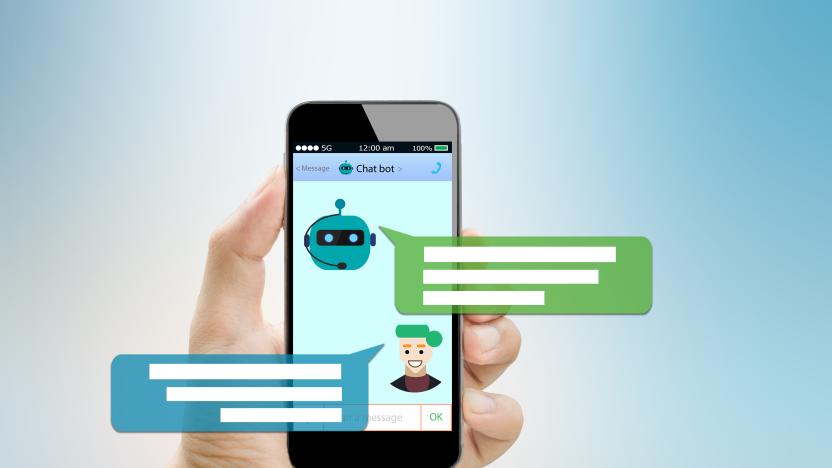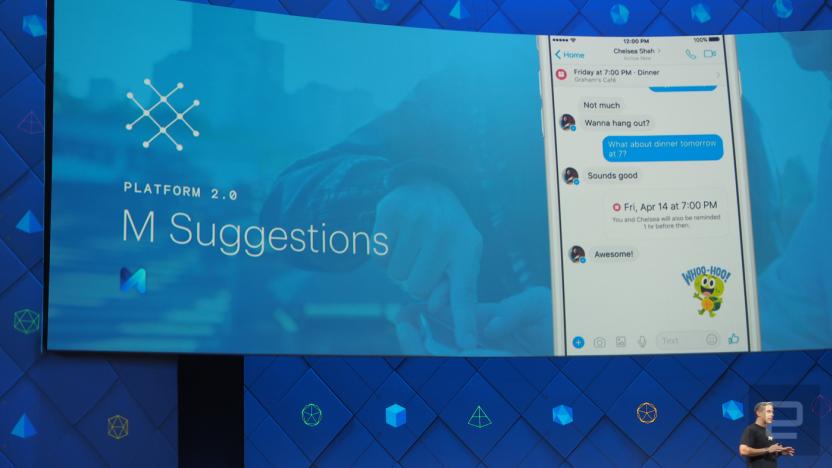FAIR
Latest

Facebook is enabling a new generation of touchy-feely robots
Facebook announced on Monday that it has developed a suite of tactile technologies that will impart a sense of touch into robots.

Facebook has trained an AI to treat irrelevant data like spoiled milk
Facebook researchers hope to help future AIs pay better attention by giving data an expiration date.

Facebook and NYU trained an AI to estimate COVID outcomes
Complicating the public health response is the fact that we still know so little about how the virus operates -- such as why some patients remain asymptomatic while it ravages others. When the outbreak first reached New York City, “we started trying to figure out what to do, how we could actually help manage the patients,” Moore continued.

Facebook releases its 'Blender' chatbot as an open-source project
Facebook has spent years training its Blender chatbot on 9.4 billion conversational parameters. Now the company is releasing it as an open-source project.

Ford sells off its monthly car subscription service
Fair, the app-based vehicle subscription service that partners with Uber, has agreed to acquire a similar service by Ford. The Santa Monica-based startup announced today that it has bought Ford's Canvas for an undisclosed sum. Since 2017, Canvas offered variable-term leases for Ford owners in San Francisco, eventually expanding to Los Angeles and Dallas. A total of 3,800 subscribers used Canvas to acquire new Ford vehicles.

How AI made Facebook’s Portal your ‘personal cameraman’
After releasing its Portal video-calling tool to largely positive reviews (especially from its employees) last November, Facebook is finally cracking open the device and giving the rest of us a glimpse at the Portal's inner workings. Engadget sat down with Facebook's Rafa Camargo, Vice President of Hardware, and Matt Uyttendaele, Engineering Director of Mobile Vision to discuss the device's development and the artificial intelligence that powers Portal.

Facebook and NYU researchers aim to use AI to speed up MRI scans
Facebook is teaming up with researchers at the NYU School of Medicine's Department of Radiology in order to make MRIs more accessible. Scientists with the Facebook Artificial Intelligence Research (FAIR) group and NYU note that getting an MRI scan can take up a fair amount of time, sometimes over an hour, and for people who have a hard time laying still for that period of time -- including children, those who are claustrophobic or individuals with conditions that make it painful to do so -- the length of a typical MRI scan poses a problem. So the researchers are turning to AI.

Facebook AI turns whistling into musical masterpieces
Ever wish you could whistle a tune and have a computer build a whole song out of that idea? It might just happen. Facebook AI Research has developed an AI that can convert music in one style or genre into virtually any other. Instead of simply trying to repeat notes or style-specific traits, the approach uses unsupervised training to teach a neural network how to create similar noises all on its own. Facebook's system even prevents the AI from simply memorizing the audio signal by purposefully distorting the input.

Facebook tries giving chatbots a consistent personality
Dig into the personalities of chat bots and you'll find that they're about as shallow as they were in the days of Eliza or Dr. Sbaitso. They respond with canned phrases and tend to be blithely unaware of what you've said. Facebook wants to fix that. Its research team has tested a new approach that gives bots more consistent personalities and more natural responses. Facebook taught its AI to look for patterns in a special 164,000-utterance data set, Persona-Chat, that included a handful of facts about a given bot's persona. An AI trying to mimic a real person would have five biographical statements to work with, such as its family and hobbies, with each of them revised to say the same things in a different way. Train existing chat bots from that and you get AI that 'knows' what it likes, but still maintains the context of a conversation and speaks relatively fluently.

Facebook's latest AI add-on will teach chatbots to sound less robotic
If you've been paying any attention to what Facebook is up to lately, you'll know that artificial intelligence and conversational chat bots are two of the most important initiatives for the company. Today, the Facebook Artificial Intelligence Research group (FAIR) is announcing a new initiative that bridges the two. A new online "lab" will let anyone test and use publicly-available datasets to test their own AI dialog systems. The new system, called ParlAI, is FAIR's attempt to make smarter AI bots that aren't as single-minded as many of the ones available now.

White House will host its first Maker Faire later this year
Many will tell you that Maker Faires inspire entrepreneurs, and the White House certainly agrees -- it wants to foster that inventive spirit across the US. Accordingly, it just unveiled plans to host the first-ever White House Maker Faire later in 2014. Details of the competition are coming later, but the government is already encouraging builders to share their creations through both email and Twitter. The upcoming Faire is part of a broader initiative that will encourage support for maker spaces and startups. We wouldn't expect the event to create the next Elon Musk, but it might just give indie gadget designers the exposure (and potentially, funding) they crave.

Some Assembly Required: On balance and fairness
Today it occurred to me that The Secret World's faction choice is meaningless. You're probably aware that the game features three organizations, but if you're not a regular player, you may not know that picking one is largely an aesthetic exercise. Sure you get different lines of dialogue in the game's numerous cutscenes depending upon whether you're a Dragon or a Templar, and you get Illuminati-specific outfits if you roll that way, but outside of these niceties and perhaps roleplay, TSW's factions are pretty pointless. They're pointless because there's no real consequence for picking one over the other, and there's no lasting impact on either the world or gameplay that results from in-game factional "wins." Anyhow, when I mentioned this to a friend, his very first comment was that "any changes would need to be fair and inclusive."

360iDev: The case for 'fair pricing' on iOS apps
A few developers have talked before about the App Store's "race to the bottom" problem, and Joe Cieplinski has clearly been doing some thinking about the issue as well. In his talk at 360iDev this week, Cieplinski (a former English teacher and Apple Store employee who now works as a designer for Bombing Brain Interactive, makers of an app called Teleprompt+ for iPad) pointed out that back in the early days of the App Store, some developers decided to try and price their apps at Apple's lowest option of 99 cents ("I didn't get an email," he joked, "Were you guys consulted?"). A few of those 99 cent apps made millions of dollars, and Cieplinski says that other iOS developers wrongly decided that "99 cents must be the reason" for that success. As a result, 99 cents has become the standard for most App Store apps, with many other apps moving even lower down to free. At this rate, Cieplinski joked again, developers will soon be paying people to install their apps, and indeed, he said, that's already happening. So how can we fix this? Cieplinski says that most of the apps being sold for just 99 cents on the App Store are worth more than that, but "customers have been conditioned to think this is what your app is worth," and many developers are worried that if they move up to a higher price point, their users will revolt completely. But Cieplinski is also convinced that what's commonly called a "premium price" should instead be called a "fair price." Developers shouldn't be ashamed to charge customers what their apps (assuming the quality is high) are worth. Apple set this tone when the iPad arrived, said Cieplinski. When the iWork apps first appeared, they were priced at $9.99 each, and not only have those sold like gangbusters for Apple, but the pricing on those apps is meant to serve as a message to developers from Cupertino: "You can charge more than 99 cents," Cieplinski said. "Start doing it." He should know, too -- Teleprompt+ was released at a price of $9.99, and while Cieplinski calls early sales "modest," he said they actually increased over time. Most freemium and 99 cent apps see a large sales spike at release and then fall off precipitously, but Teleprompt+ saw a different curve, one that rose slowly but surely as time went on. So much so, in fact, that when Bombing Brain updated the app to version 2.0 with a significant redesign and new features, they raised the price to $14.99. And the real kicker: They saw sales increase. Now, this likely won't work for all developers -- Cieplinski points out that if you're going to charge more for an app, it better be a really great app, and you better have the resources (or at least be willing to put in the work) to do things like market your app to the right audience, provide flawless and responsive tech support, and update your app "early and often," making sure that it provides a lot of value to its users. But if developers are able to do this, they can not only charge a premium price, but they can demand a premium customer. Customers that buy apps at higher prices, said Cieplinski, are big seekers of value, and are willing to really use and become dedicated to the apps they invest in. If someone spends $9.99 on an app, they're more likely to use it again and again, and eventually love it so much so that they recommend it to everyone they know. Cieplinski's points are intriguing. It's hard to see the 99 cent price disappear from the store entirely -- there are definitely developers out there (and apps) that are meant to be more impulse purchases and relatively throwaway thrills. And there will always be developers ready to undercut their colleagues, in order to simply grab the largest audience possible. But Cieplinski did his best to prove that there is a market for "fair priced" apps on the App Store, and that developers willing to charge more for apps that are worth it will be able to reap higher rewards as well.

The Soapbox: The illusion of balance
Disclaimer: The Soapbox column is entirely the opinion of this week's writer and does not necessarily reflect the views of Massively as a whole. If you're afraid of opinions other than your own, you might want to skip this column. Somewhere, on a lone computer in a lonely room, sits the archetype for a balanced MMO, one in which every set of abilities in a skill-based MMO is just as useful as every other set of abilities and every class in a class-based game is just as potent as every other class. There are no disparities in terms of power level, no massive gaps in gearing, and no issues with the specific fights. It is an entirely balanced machine. And as long as we're creating a myth with no place in reality, let's assume that it's being guarded by unicorns. That's the problem with balance -- it's an idea that doesn't actually work in a real environment. We talk a lot about wanting games to have balanced systems, and there are players devoted to declaring with great fervor that classes aren't balanced against one another, but balance is such a hazy concept that no matter how much you want a balanced game, it doesn't really exist.

The Daily Grind: Do you want a 'fair' fight?
Fair is a four-letter word. I mean, literally it is; you can count them if you like. It's a figurative four-letter word too, especially when it comes to MMO design and PvP. What's unfair to some is smart tactics to others, and the subjectivity here is responsible for a large part of the rancor that underlies PvP discourse. Funcom's Craig Morrison recently expounded on the subject via his personal blog, and among the interesting nuggets up for discussion was the notion of a fair fight (and more specifically, whether MMO players actually want one). Some do and some don't, of course, but the more important question seems to be what is a "fair" fight? Can it even be defined, let alone coded? Morrison writes that "most people simply don't like being fodder for a dominating force. They don't like to be bullied or out-muscled by a force that the game mechanics have allowed to have a clear position of dominance." He's right, but what's left unsaid is that everyone has the same opportunity to take advantage of those game mechanics. What say you, Massively readers? Do you want a "fair" fight? If so, how do you define the word in this particular context? Every morning, the Massively bloggers probe the minds of their readers with deep, thought-provoking questions about that most serious of topics: massively online gaming. We crave your opinions, so grab your caffeinated beverage of choice and chime in on today's Daily Grind!

Lost Pages of Taborea: Content needs to meet the versatility of gear-upgrading
Last week I compared looting and class-bending in Runes of Magic with similar features found in RIFT. RoM's system of gear customization was a part of that article. This week, I want to talk business. Don't worry, I'm not a business major about to sling pie charts at you or talk about quarterly earnings. I want to talk a bit about business, specifically about how it might relate to decisions developers make concerning what kind of balance to put into an MMO. RoM's gear system is extremely flexible on the outside, but inside there are some restrictions. Some of these restrictions are imposed by the game, but some are imposed by players. In this week's Lost Pages of Taborea, let's take a look at how the flexibility and choice of RoM's gear system -- and other systems -- are in opposition to the game's content and some desires players have.

Breakfast Topic: Brewing up better faires and festivals
This Breakfast Topic has been brought to you by Seed, the Aol guest writer program that brings your words to WoW.com. I've just spent a day being Scottish. My father's family hails from Scotland, and the summer months will find me out and about at a variety of highland games in the Midwest. Sometimes I'm a spectator, and sometimes I run a tent for my clan. There's a general understanding that the highland games were created to prepare men for doing battle with the English. Each part of what has become the athletic portion of the games can be traced back a need for hurling hurl rocks, logs or flaming bales of vegetation at advancing troops or fortified positions. At the games I just attended, a group gave demonstrations on medieval swordplay. In World of Warcraft, the Argent Tournament springs immediately to mind. We were informed this was a training ground to prepare us for an assault on the LIch King and his forces. The Darkmoon Faire and Brewfest are examples of festivals with games of chance, food and vendors, and tickets you have to procure by participating in events or getting lots of items requested by vendors. We've heard rumors (or perhaps it was a column of wishful thinking on WoW.com's part) about an upgrade to the Darkmoon Faire. I'd go more often if I could make an attempt to toss a caber, the stone or the sheaf. These are strength and agility events; having purchasable trinkets for both attributes would give everyone a chance to succeed. Rewards could be class-specific buff items of a certain duration. If you can get the caber to twelve o'clock (the prime position for this event; check out the North American Scottish Games Association for the rules), you get a scroll that will give a hunter an additional 50 agility for 10 minutes. It might be something of minor interest to a level 80 -- but you can be sure I'd be at the faire, just to try to toss a caber.

The Daily Grind: What isn't fair?
To many people, "fair" occupies the same mental space as Santa Claus and the Fallout MMO -- it's nice to believe in, but it doesn't really exist. Balance in an MMO is hard enough without adding in standards of fair play, and in any environment more complex than Team Fortress 2, there will be some things youu consider blatantly unbalanced. (Even in that environment, actually.) But there are always some things that strike you as just being inherently not fair -- things that on a conceptual level make the game less fun, especially in PvP. Stuff where you find yourself blaming the mechanic even when something is your own fault. Stealth is a classic one, as many players find the idea that you could be killed by a heretofore unseen presence not remotely fair. Another classic is any form of crowd control -- few people are pleased at PvP matches consisting of their character being unable to act while other players unload on them. What about you? What mechanics do you consider inherently unfair to play against?

Blizzard and how they deal with ninjas
Wojtek sent us this thread in which he posted a long series of emails between him and Blizzard about the ninja of an Onyxia Drake. There's a lot of back and forth, but eventually, the bottom line is that Blizzard was not able to help him, whether that's because he didn't have the information right, they couldn't find what they needed in the chat logs, or they just didn't want to. Later on, the thread is locked, and Wojtek is given the usual feedback address for the GM actions. So what does all this mean? We've heard in the past that Blizzard will occasionally help with ninjas, and we've even heard unofficially that if you get the main looter in a PuG raid to state the looting conditions ahead of time, Blizzard can go back, look that up, and then reward loot based on who really deserves it. But of course, all of that is unofficial, and there are so many variations and issues in situations like these that there can't really be a hard and fast rule -- sometimes Blizzard can help, sometimes they can't.

SWAPS loot system offers another DKP option
I'm finding myself really fascinated with loot systems lately -- the old DKP is pretty good, but even that has drama, and it seems like there's a lot of interesting ideas going around about how to evenly and fairly distribute loot amongst a group of people. OutDPS has a writeup about a loot system called SWAPS. Instead of sending "points" off into the void, you actually "give" your spent points to everyone else in the raid. You start out with 1,000 free points (though those are distributed over time, to prevent new players from having tons of points early on) and then when an item comes up, everyone bids on it: the highest bid gets the item and the points they bid are spread around to the rest of the raiders. In other words, if someone in a 10-man raid bids 500 points and wins an item, those 500 points are distributed evenly amongst the other nine raiders. While the winner loses the 500 points they spent, everyone else gets a bonus 56 points. The person winning the item "pays" for the privilege of taking it by beefing up everyone else's point totals.It is probably not a perfect system (there's no way to reward points for anything other than loot dropping, for one thing, and while some people have modified the rules to create a separate bidding pool for class items, the basic system doesn't cover class or offspec items), but it does solve a lot of the questions of fairness, and it keeps everything pretty above-board: if you are low on points, the only reason would be that either you just started raiding, or that you've just spent a lot of points on an item. There's an addon, of course, and it will give you all sorts of reports and updates on where all of your raiders are at in the system. If you've been poking around for a DKP system that is based on being open and fair, it might be worth trying out in your guild.








